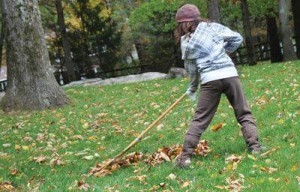 My children worked really hard that day. At the ages of ten, six, and four, they put in a good day’s work that would match any adult. They had a mission, and were driven to perform the tasks they were asked to so they could buy those very special toys. I asked dear friends from our congregation if the kids could come by their house and “work” for payment. They agreed, and I told the kids I would pay them $5.00 each to go towards the toys if they did everything they were asked. They were thrilled to be “hired” and excitedly talked about what they would buy with the money. For the next three hours, they raked leaves, picked up sticks, vacuumed, swept, mopped, cleaned windows and mirrors, and dusted.
My children worked really hard that day. At the ages of ten, six, and four, they put in a good day’s work that would match any adult. They had a mission, and were driven to perform the tasks they were asked to so they could buy those very special toys. I asked dear friends from our congregation if the kids could come by their house and “work” for payment. They agreed, and I told the kids I would pay them $5.00 each to go towards the toys if they did everything they were asked. They were thrilled to be “hired” and excitedly talked about what they would buy with the money. For the next three hours, they raked leaves, picked up sticks, vacuumed, swept, mopped, cleaned windows and mirrors, and dusted.
After the work was over, I gave each of them a five dollar bill, and to our surprise, our friends gave them a five dollar bill, too. Three hours of hard work gave each of the kids $10.00 to spend. After the payment was received, we headed to the store. Excitedly, they discussed the pros and cons of the toys they wanted, and after much deliberation, they had enough money to buy three toys each (Momma found an amazing deal at Walgreens).
With toys in hand, we marched off to our next destination. As we arrived at The Hope Chest, the kids talked about the children who would be receiving the toys. How old they would be, if the kids’ personalities were like theirs, and tried to mimic the look on the kids faces when they saw them. They handed the toys over with joy to the lady at the center, and beamed with pride as they felt the good deed they had just performed.
Teaching our children the value of good hard work is such a vital component in raising them to be dedicated, unselfish, and responsible. My husband and I have tried to do things such as what is described above in order to teach our kids that stepping out of self is a good thing. We have found things that work well, and things that do not work so well, but along the way, the kids are learning from each experience. I hope that this article gives you some ideas about instilling work ethics and stewardship in your kids, and we would love any other suggestions you have found to work out well with your family.
Pay them a commission, not an allowance. For years, we have paid our kiddos an allowance. We set aside money each week for them to save, give, and spend. This always flopped. In giving an allowance, you are just giving your kids money. The word “allowance” means an amount allowed or granted. If we allow or grant our children something, it means that it is something given, with no expectations. I would get frustrated and take away their allowance if they did not keep up with their responsibilities, which was working against me because an allowance was money given, not earned. Then Dave Ramsey gave a great suggestion. Commission. Commission is described as paid entirely or partially with commissions from sales one has made or for work one has done. This makes more sense. Now if the kids want to get paid, they have to work, and the quality of the work (remember to take the age of the child into account) will determine their commission.
Ask friends or neighbors if your kids can work for them on occasion. Let’s face it, we get pretty tired of cleaning the same old house all of the time. The kids get burned out on their responsibilities as well, and sometimes need a change of scenery. If something is coming up that the kids need extra money for, ask a friend if the kids can come clean their house. If you know of a widow, widower, or shut-in in your congregation, offer your children’s services, and let them work for other people. Pay your kids according to the work done, and be sure to thank your friends for helping you teach them to have a good work ethic. Most of the time, the friends will give them a small amount as well which gets the kids really excited.
 Divide up your child’s earnings into appropriate categories. Our kids have a jar for their money, and a donation jar for their favorite camp. Pay your children in small denominations, such as one dollar bills or coins, so they can divide up their earnings for saving, spending, and giving. Remind them about the particular things they are saving for, and about the importance of giving to others and the church.
Divide up your child’s earnings into appropriate categories. Our kids have a jar for their money, and a donation jar for their favorite camp. Pay your children in small denominations, such as one dollar bills or coins, so they can divide up their earnings for saving, spending, and giving. Remind them about the particular things they are saving for, and about the importance of giving to others and the church.
Don’t forget their offerings for Sunday morning. I am SO bad at this. I forget to have the kids grab the money they set aside each for their Sunday contribution. We must get our kids into this good habit. Find a way to help your kids remember that we need to give portions to our King every Sunday.
Let your children have a personal cause. Outside of giving on Sundays, let your child find a cause or organization that they are passionate about and let them give to that cause. During Christmas, our kids started purchasing toys to buy for children in our community through a local organization called the Hope Chest. They also throw their spare change into a change jar for Pettijohn Springs Christian Camp. This jar does not go to their camp fees, but to the camp itself. Find a cause for your child that they can donate time, money, or items to so they can feel the joy of giving outside of the collection plate.
Assign age appropriate chores. My favorite book on children is “To Train a Child” by Gwendolyn Web. She has a fantastic section about age appropriate chores and responsibilities for boys and girls. Remember that a four-year-old probably shouldn’t be cleaning toilets just yet, but he may be able to wipe down the countertops and help set the table.
 Be vocal about your budget. We do not get into the details of our budget with our kids, but we remind them that certain amounts are set aside for things such as eating out and entertainment, and when the money is out, we are done!
Be vocal about your budget. We do not get into the details of our budget with our kids, but we remind them that certain amounts are set aside for things such as eating out and entertainment, and when the money is out, we are done!
Be an example with your time and money. Take your children with you when you volunteer to show them that hard work is rewarded in different ways. Let them help you with the cause that you are involved in. Let them see your savings goals and explain why you are saving. Let them see you give each Sunday morning. The best way to teach is to do. Let them see your generosity with others, and don’t forget to be generous with your children too.
By Ashley Hudson
Ashley Hudson serves as Come Fill Your Cup’s Marketing & Publicity Manager. She and her family worship at the Madill church of Christ in Madill, OK where her husband, Jake, is the pulpit minister. She is a stay-at-home-mom with three children who enjoys photography as well as speaking and writing. Be sure to check out her blog at www.hudsonfive.wordpress.com
 Welcome! We are so glad you stopped by. Come Fill Your Cup is a group of Christian ladies dedicated to equipping women for study and service. We know you are busy and that life’s hectic pace pulls you in so many directions, but you can’t truly be the woman God desires unless you take time to fill your own cup…not with spa days (though we love a good spa!) or the latest novel…but with God’s Holy Word. We want to help you with that! Our goal is to reach you in the midst of your busy day and give you encouragement, education, and fellowship as you strive to live the life God has laid before you. Our prayer is that we can help fill your cup so that you, in turn, can overflow to all those around you. So, as we like to say…come fill your cup, and let it overflow!
Welcome! We are so glad you stopped by. Come Fill Your Cup is a group of Christian ladies dedicated to equipping women for study and service. We know you are busy and that life’s hectic pace pulls you in so many directions, but you can’t truly be the woman God desires unless you take time to fill your own cup…not with spa days (though we love a good spa!) or the latest novel…but with God’s Holy Word. We want to help you with that! Our goal is to reach you in the midst of your busy day and give you encouragement, education, and fellowship as you strive to live the life God has laid before you. Our prayer is that we can help fill your cup so that you, in turn, can overflow to all those around you. So, as we like to say…come fill your cup, and let it overflow!
What a practical, encouraging article! Thank you so much sweet sister for your servant heart, & your love for the Lord & your family, it shows!
Aww, thank YOU Mrs. Wonderful for your sweet words! Love ya!
Thank you Ashley for another encouraging article and showing the importance of teaching this to our little children!
Thanks for reading! I really strongly like your name… its too cute, not ordinary like…Ashley. Hope this article gave you some ideas for your little ones, and hope it will spark some ideas of your own. God bless!
Well done, Ashley!! Thank you for the practical ideas that every family can use – much love to you!
Thanks Jennifer! I love ya too.